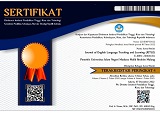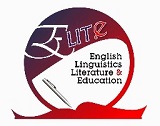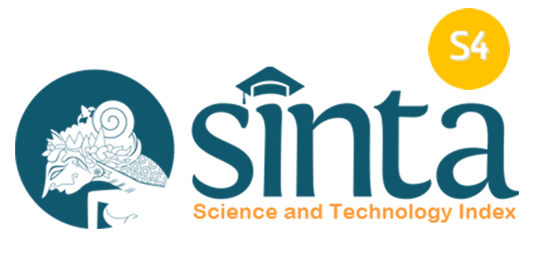A conceptual article: The teachers’ role in implementing cognitive reading strategies to enhance students' reading comprehension
Abstract
Keywords
Full Text:
PDFReferences
Adam, A. (2018). Improving students’ reading comprehension of descriptive texts through cognitive strategy at grade VII-2 of SMPN I Indra Praja Tembilahan. ANGLO-SAXON: Jurnal Ilmiah Program Studi Pendidikan Bahasa Inggris, 8(2), 166–177. https://doi.org/10.33373/anglo.v8i2.1216
Anggrisia, N., & Bisriyah, M. (2020). Using online recount texts to improve the eighth graders’ reading comprehension. Proceedings of the Proceedings of the 2nd International Conference on Quran and Hadith Studies Information Technology and Media in Conjunction with the 1st International Conference on Islam, Science and Technology, ICONQUHAS & ICONIST, Bandung, October 2-4, 2018, Indonesia. Proceedings of the 2nd International Conference on Quran and Hadith Studies Information Technology and Media in Conjunction with the 1st International Conference on Islam, Science and Technology, ICONQUHAS & ICONIST, Bandung, October 2-4, 2018, Indonesia, Bandung, Indonesia. https://doi.org/10.4108/eai.2-10-2018.2295575
Aristha Shan G, Ngadiso, A. A. (2012). Improving students’ reading skill through numbered heads together technique. English Education, 66, 37–39.
Asmara, N. I. (2017). An analysis of cognitive reading strategies used in reading comprehension. Proceedings of the Ninth International Conference on Applied Linguistics (CONAPLIN 9). Ninth International Conference on Applied Linguistics (CONAPLIN 9), Bandung, Indonesia. https://doi.org/10.2991/conaplin-16.2017.69
Budianto, L., & Yuniar, R. F. (2023). The effect of suggestopedia method on Indonesian EFL learners’ reading achievement. Journal of English Language Teaching (JETLE) 4(2), 56–69. https://doi.org/10.18860/jetle.v4i2.20573
Budiharso, T. (2014). Reading strategies in EFL classroom: A theoretical review. CENDEKIA: Journal of Education and Teaching, 8(2), 189. https://doi.org/10.30957/cendekia.v8i2.63
Deshpande, S. K. (2016). Activating background knowledge: An effective strategy to develop reading comprehension skills. Journal of English Language Teaching and Linguistics, 1(3), 191–202. https://doi.org/10.21462/jeltl.v1i3.28
Elihami. (2017). Increasing students’ reading comprehension through cognitive strategies of senior high school of Sidenreng Rappang Regency. Lingua Cultura, 11(2), 103. https://doi.org/10.21512/lc.v11i2.921
Etfita, F. (2018). Improving students’ reading comprehension of descriptive texts through cognitive strategy at grade VII-2 of SMPN 1 Indra Praja Tembilahan. Lingua Didaktika: Jurnal Bahasa Dan Pembelajaran Bahasa, 7(2), 75. https://doi.org/10.24036/ld.v7i2.10347
Gustanti, Y., & Ayu, M. (2021). The correlation between cognitive reading strategies and students’ English proficiency test score. Journal of English Language Teaching and Learning, 2(2), 95–100. https://doi.org/10.33365/jeltl.v2i2.1452
Hidayati, H. (2020). Improving students reading comprehension of VIII grade students at SMP Negeri 3 Galang through think aloud strategy. Jurnal Madako Education, 3(2). Retrieved from https://ojs.umada.ac.id/index.php/jme/article/view/40
Khori, Mhd, and Arimuliani Ahmad. 2019. Enhancing students’ reading comprehension through the collaboration between reciprocal teaching and cooperative learning. in Proceedings of the 1st International Conference on Innovation in Education (ICoIE 2018). Atlantis Press.
Ligudon, J. P. & Ilodefonso, L. D. (2022). Reading strategies employed by senior high school english teachers in the Philippines. Quantum Journal of Social Sciences and Humanities, 3(2003), 93–106.
Maiwen, S., & Jufri. (2020). The Cognitive Reading Strategy in Learning English. 405 (Iclles 2019), 170–174. https://doi.org/10.2991/assehr.k.200217.035
Munjid, M.F., & Astiyandha, T. (2017). Exploring the students’ reading strategies on tenth grade of senior high school. Lingua Didaktika: Jurnal Bahasa Dan Pembelajaran Bahasa, 5(1), 1689–1699.
Oktavianti, R. (2019). The correlation between cognitive strategies and students’reading comprehension of eleventh grade at SMK Negeri 2 Nganjuk. EDUSCOPE: Jurnal Pendidikan, Pembelajaran, Dan Teknologi, 4(2), 15–20. https://doi.org/10.32764/eduscope.v4i2.1117
Pahamzah, J., & Viona, M. (2021). Students’ difficulties in reading comprehension at junior high school level. Linguistica Antverpiensia, 2002. www.hivt.be
Ratna, A. (2014). The use of cognitive reading strategies to enhance EFL students’ reading comprehension. International Journal of Education (IJE), 2(1), 1–11.
Rini, S. (2017). What a teacher do in using cognitive strategy instruction for teaching reading. International Conference on Education, 2005, 1–9. https://202.91.10.50/prosiding/index.php/ice/article/view/120/0
Rohmana, W. I. M., & Amalia, K. R. (2022). Exploring the use of narrative text in teaching reading comprehension in EFL classroom. Proceeding of International Conference on Islamic Education (ICIED), 488–496.
Rusmiati & Kamalina. 2017. the use of direct strategies in reading comprehension (A descriptive study at senior high school Al-Falah Abu Lam U Aceh Besar). Getsempena English Education Journal 3(2):40–61.
Schmitz, A., & Dannecker, W. (2023). Strategies for expository and narrative texts: Students’ perspectives on text type-specific cognitive and metacognitive reading strategies. L1-Educational Studies in Language and Literature, 23, 1–22. https://doi.org/10.21248/l1esll.2023.23.1.407
Suyitno, I. (2017). Cognitive strategies use in reading comprehension and its contributions to students’ achievement. IAFOR Journal of Education, 5(3), 107–121.
Thư, L. M., Anh, K. H., & Nam, N. T. P. (2019). Effects of cognitive reading strategy training on reading performance of EFL students: A case of a high school in Vietnam. Dalat University Journal of Science, 87–105. https://doi.org/10.37569/DalatUniversity.9.4.562(2019)
Tunga, Sisilia Gracella. 2021. Cognitive strategies in reading critically by high and low achievers. Lectio : Journal of Language and Language Teaching 1(1):1–12.
Wahyono, E. (2019). Correlation between students’ cognitive reading strategies and reading comprehension. Jurnal Studi Guru dan Pembelajaran, 2(3), 256–263. https://doi.org/10.30605/jsgp.2.3.2019.61
Zhang, X., & Guo, L. (2020). Cognitive and metacognitive reading strategies training in EFL reading. Proceedings of the International Conference on Education, Economics and Information Management (ICEEIM 2019). International Conference on Education, Economics and Information Management (ICEEIM 2019), Wuhan, Hubei, China. https://doi.org/10.2991/assehr.k.200401.028
DOI: https://doi.org/10.18860/jetle.v6i1.27136
Refbacks
- There are currently no refbacks.
Jalan Gajayana 50 Malang 65144, Jawa Timur, Indonesia

This work is licensed under a Creative Commons Attribution-ShareAlike 4.0 International License.
Indexed by





